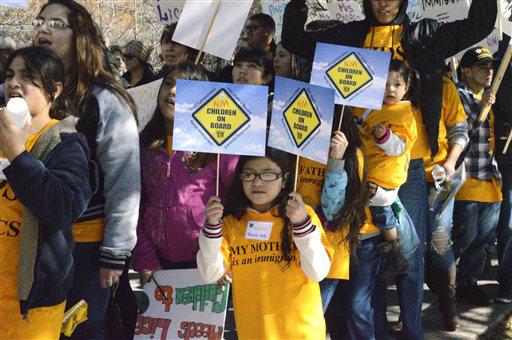Social justice extends to immigrants

Russel Contreras/ Associated Press
Immigrant advocates attend a Feb. 2 rally to protest a proposal that would repeal a law and prohibit immigrants from being able to get driver’s licenses in New Mexico. JSRI believes immigration is a national problem, and they hope to work on it in the New Orleans community.
February 5, 2015
The Jesuit Social Research Institute at Loyola is striving to transform the South through action, research, advocacy, social analysis and theological reflection.
The group is currently focused on three main issues that emerged after Hurricane Katrina, including race, poverty and migration.
Mary Baudouin, provincial assistant for social ministries and representative for the Jesuits, said these are the main issues that are currently held by Jesuits across the world.
“The Jesuits have been, for a number of years, supporting legislation for comprehensive immigration reform. The Jesuit conference has representatives that work on behalf of the Jesuits in coalition with a number of other groups that are working on immigration issues, primarily through a campaign called the Justice for Immigrants campaign, which is a big campaign of the Catholic Church,” Baudouin said.
Baudouin said that this is just one area of the multi-faceted issues the Jesuits have been focusing on. Recently, attention has spread to the children involved.
“There is a real concern about the number children who have been coming particularly from Honduras, Guatemala, El Salvador and Nicaragua, who are fleeing really violent situations in their countries,” Baudouin said.
The Jesuits have made their way to these areas despite personal endangerment.
“We have Jesuits that work in Honduras on social justice issues. Some of them have death threats against them, and they asked us, as the U.S., to help and get involved with the issues there,” Baudouin said.
The Jesuits are working to influence the government of the migrants’ home countries in any way possible. Baudouin said that every few years, the Jesuits look toward the status and future of their order, which has ultimately resulted in working for social justice.
“It is really a top priority of the Jesuits to take care of refugees and immigrants; apostolic priority is what they call it,” Baudouin said.
The right to migration is a basic human right according to The Rev. Fred Kammer, S.J. in his article “Catholic Social Teaching and Migration.” He gives insight to the reason behind migration of this nature.
“The right to life and the conditions worthy of life — when threatened by poverty, injustice, religious intolerance, armed conflict and other root causes — give rise to the right to migrate,” Kammer said in his article.
The rejection of migrants’ rights fuels the Jesuits’ deep commitment to the just treatment of migrants.
According to the migration specialist Susan M. Weishar, several major Jesuit entities are working on migration issues in the United States, especially for comprehensive migration reform and fair treatment of asylum seekers near the U.S. border.
“I am motivated by my faith to do this but certainly its efficacy speaking out on social justice issue is a core American value that is one of our great civil rights,” Weishar said.
She said that she encourages Loyola students to take part in the search for just treatment and dignity for immigrants.
“It is a pivotal human rights issue,” Weishar said. “I would invite Loyola students to actually get involved with volunteer service where they can get engaged and come to know immigrants who are trapped in this nightmarish situation of undocumentation.”
One of the many volunteer opportunities is at Cafe Con Ingles, where volunteers can have a one-on-one experience with adult immigrants.
“If you care about justice and compassion and solidarity, then this is an issue that you really need to get involved in,” Weishar said.






